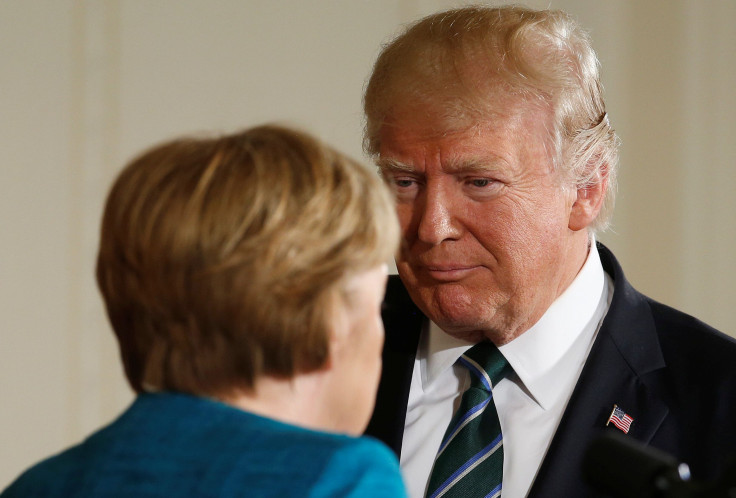Trump Merkel Handshake: White House Meeting Discussed Trade, NATO, Immigration

The first meeting between President Donald Trump and German Chancellor Angela Merkel ended on an awkward note as he appeared to ignore a request by Merkel for a handshake before a joint press conference Friday, reports said. The rejection for a handshake from Trump's side reflected the difference in views between the two on a wide range of issues including trade, Russia and immigration, which led to some uneasy moments at the news conference.
Angela Merkel asked President Trump to shake hands. He appeared to ignored her https://t.co/pW2tjN99Fx pic.twitter.com/uxhEiIpcxp
— TIME (@TIME) March 18, 2017
When Merkel arrived at the White House, she and Trump shook hands. The leaders then met privately in the Oval Office, before meeting journalists there. Even as Merkel kept leaning toward him in a friendly gesture, Trump looked straight ahead, sitting with his legs apart and hands together. Throughout the press conference, Merkel appeared relaxed but the body language between them was not so warm, reports said. Later, both leaders told reporters their meeting was very good.
Read: What Are The Core Issues To Be Discussed During Trump And Merkel's First Meeting?
During the meeting, Trump complained that the U.S. had been treated “very, very unfairly” and sarcastically praised German trade officials for having an upper hand over their American counterparts.
"On trade with Germany, I think we’re going to do fantastically well. Right now, I would say that the negotiators for Germany have done a far better job than the negotiators for the United States. ... We don’t want victory, we want fairness. All I want is fairness," Trump said during the press conference.
Read: France's Hollande, Germany's Merkel Say Trump Poses A 'Challenge'
Trump also made it clear to Merkel that Germany and other European nations must pay their "fair share" of costs for NATO.
Trump said: “I reiterated to Chancellor Merkel my strong support for NATO, as well as the need for our NATO allies to pay their fair share for the cost of defense. Many nations owe vast sums of money from past years, and it is very unfair to the United States. These nations must pay what they owe.”
Contrasting views regarding immigration came to the fore too, when Trump said: "We also recognize that immigration security is national security. We must protect our citizens from those who seek to spread terrorism, extremism and violence inside our borders. Immigration is a privilege, not a right, and the safety of our citizens must always come first, without question."
In response, Merkel said it was important to stop traffickers but it must be done with the aim of giving refugees the chance to lead better lives.
"Migration, immigration, integration has to be worked on, obviously. Traffickers have to be stopped. But this has to be done while looking at the refugees as well, giving them opportunities to shape their own lives where they are; help countries who right now are not in an ability to do so -- sometimes because they have civil war," she said.
© Copyright IBTimes 2024. All rights reserved.












